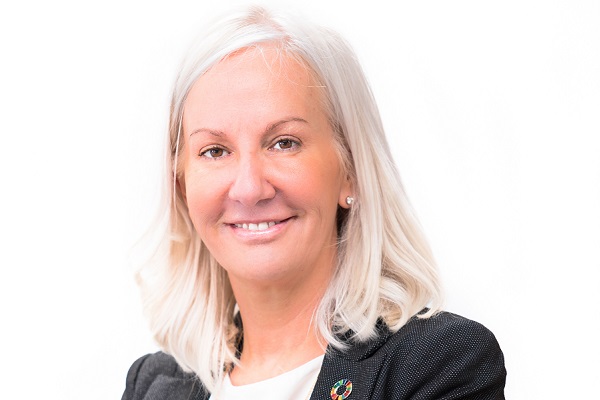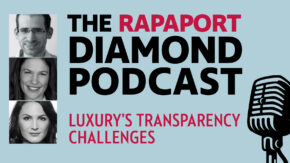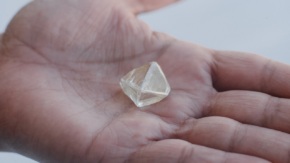To mark International Women’s Day, Iris Van der Veken, executive director of the Responsible Jewellery Council, calls for industry-wide action to empower women.
RAPAPORT… As we look back and take stock of the year that was and gaze longingly at the light at the end of this tunnel we have all been in — together yet physically distanced — there are ripple effects from the Covid-19 pandemic that are now becoming visible. One of the areas where the pandemic has clearly had a regressive effect is the march toward gender equality. Even before this crisis, the global progress in tackling gender gaps had been marginal since 2015. But as a result of the pandemic, women’s economic prospects have been hit much harder.
According to a recent McKinsey & Company report, “women’s jobs globally are 1.8 times as vulnerable to this crisis as men’s jobs. Women make up 39% of global employment but accounted for 54% of overall job losses.” The reasons are systemic — women are disproportionately represented in the industries that are hardest hit, and unpaid care work, which women shoulder more than men, has gone up due to the closure of schools and nurseries. The impact on women of color has been even more pronounced, stalling careers and pushing women into financial insecurity. Non-economic impacts such as domestic violence have also hit women harder. Empirical indicators show an increase in domestic abuse across many countries, exacerbating an already underreported and hence underestimated issue.
However, all is not dark and gloomy. Like all crises, this crisis also offers an opportunity. An opportunity to build back better. An opportunity to realize that we are indeed at a crossroads, and the paths we choose from here on as individuals and as companies will have effects for decades to come. The aim of UN Sustainable Development Goal 5 — to achieve gender equality and empower all women and girls by 2030 — is ambitious but, with concerted effort, entirely achievable. We cannot let this crisis erase the slow but steady progress that has been made toward this goal in the past few years.
In the jewelry industry, the case for supporting women’s empowerment is particularly strong. Before “influencer” became a job description, women were already influencing buying behavior significantly in our industry. According to most estimates, women drive demand for more than 90% of the world’s jewelry. Also, in the rapidly growing ethical consumer movement, millennial and now Gen Z women and girls are driving consumer decisions toward products and companies that protect their supply chains.
The evident complexities in jewelry supply chains and the fact that large parts of the upstream supply chains involve artisanal small-scale mining (ASM) make these efforts even more challenging. A significant portion of these supply chains are located in developing countries where low wages, poor working conditions, and exposure to health and safety hazards are more prevalent. An estimated 100 million or more people work in or rely on ASM. The majority of ASM communities are found in sparsely populated, rural, and often remote regions.
I applaud the work of IMPACT, which has developed practical toolkits to help make sure ASM-related initiatives are meaningful and help women, and advance the gender equality agenda. IMPACT has published the first-ever Gender Impact Assessment tailored specifically to the ASM sector. It has been developed over the course of IMPACT’s work in the Democratic Republic of Congo and Uganda and includes strategic tools to support teams that create projects and policies to improve experiences and outcomes in the ASM sector.
I applaud the work of GemFair. In 2018, De Beers launched the GemFair pilot program, creating a secure and transparent route to market for ethically sourced ASM diamonds from Sierra Leone. “The GemFair model has huge long-term potential to transform the ASM sector by formalizing access to international markets and raising operating and ethical standards across the sector,” says Feriel Zerouki, senior vice president of international relations and ethical initiatives at De Beers Group.
According to a Business for Social Responsibility (BSR) report on “Women in the Jewelry Supply Chain,” here are the eight building blocks of women’s economic empowerment:
– Access to safe and equitable employment opportunities
– Access to and control over economic resources and opportunities
– Education and training
– Social protection and childcare
– Access to and control over reproductive health and family formation
– Freedom from the risk of violence
– Voice in society and policy influence
– Freedom of movement
We in the jewelry industry have a unique opportunity to improve the lives and livelihoods of women in so many parts of the world, which in turn will strengthen and transform our supply chains and businesses. The road ahead is long, and yes, there have been some major setbacks, but the challenges facing us are not insurmountable.
The Responsible Jewellery Council (RJC) believes all stakeholders have a shared responsibility to create more empowerment opportunities for women, as gender equality cannot be achieved when women do not have the resources needed to empower themselves. We are actively involved in promoting women’s empowerment as part of our commitment to the UN’s Sustainable Development Goals.
We have a very ambitious plan for 2021 that will include local stakeholder exercises to share knowledge and tools to support our members and the industry at large in integrating diversity and inclusion into the heart of their operations. We will continue to work with key stakeholders such as the United Nations Global Compact (UNGC), World Jewellery Confederation (CIBJO), World Diamond Council (WDC), Natural Diamond Council (NDC), Union Française de la Bijouterie, Joaillerie, Orfèvrerie, des Pierres et Perles (BJOP), Gem and Jewelry Institute of Thailand (GIT), Jewelry Leadership Forum (JLF), The Plumb Club, the Women’s Jewelry Association (WJA), and Diamonds Do Good, just to name a few to advance the 17 Sustainable Development Goals.
This sustainability agenda of the world is about leaving no one behind. I strongly believe this is a collective responsibility, and I am very much looking forward to working with key governments, NGOs and key industry stakeholders to succeed.
We must recognize that each of us has a role to play — as leaders, mothers, teachers and citizens who are hoping that the world that awaits us on the other side of this tunnel is a better, more equitable world. And this International Women’s Day, perhaps we can all reaffirm our pledges.
On a very personal note, I am requesting that we take the time to reflect on the roles we have played and those that we can play going forward — be it mentoring, knowledge sharing, or being connectors for our future women leaders. I know for sure that I would not be here writing this if it hadn’t been for the brilliant and brave women and men in my life who, with their wisdom, courage and resilience, paved the way for women like me to dream and to have the privilege to strive for the opportunities that have made us who we are. And with that privilege comes great responsibility. The responsibility to continue to pave the path for the generations of women to come.
In the words of United Nations Under-Secretary-General and UN Women Executive Director Dr. Phumzile Mlambo-Ngcuka: “We must not rebuild the old world, but make women and girls central to plans that bring a better future.” A simple yet powerful call to action!
Stay safe.
Best wishes,
Iris Van der Veken
Iris Van der Veken (pictured) is the executive director of the Responsible Jewellery Council.



